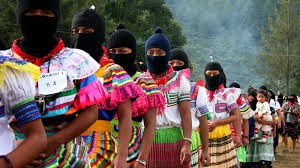
There is never just one viewpoint among any group of people. As we remember, the Zapatistas did not and do not support Morena; they do not believe in electoral politics and concentrate on creating autonomous zones for indigenous peoples to govern themselves. On the other hand, there was a higher rate of indigenous electoral participation in the 2018 election than in any other past election, including support for AMLO. There have been protests against AMLO’s proposal of a “Maya Train” to be built through the Yucatan peninsula; some fear that this would mean a mainstream Mexican and corporate penetration that would threaten indigenous culture and self-sufficiency. Other would welcome the easier transport of people and goods; in the existing condition of exclusion and lack of infrastructure investment, the people in the Yucatan peninsula can’t visit relatives who live in a different state or even municipality; nor have they the means to take the season’s harvests to the marketplace before it rots. In short, the relationship of the Mexican government with indigenous peoples is fraught with contradictions. There is too much history for trust to develop overnight.
AMLO is trying to change that dynamic. He has actually taken a lot of flack – accused of reverse racism – because he is giving pensions to indigenous people at a younger age than others, as mentioned above. Second, he has held consultations with people in the areas through which the Maya Train is slated to go, and asked them to vote for or against it, promising not to build it if it is not wanted. Third, he wants Zapatista inclusion in policy discussions. And finally, he has given asylum to Bolivia’s indigenous President, Evo Morales.
Our Project aims to build solidarity with Mexico’s social movements including the Zapatistas, and is not simply to cheerlead for AMLO/Morena. The courageous stances and democratic principles of the Zapatistas have inspired many of us across the world. At the same time, they can act in ultra-left ways in opposing equally all who are not part of their project. It seems similar to the US leftists who saw absolutely no difference between Trump and Clinton.
And while we see AMLO’s election as a significant victory for the forces against corruption and austerity, we recognize that he is far from a revolutionary socialist. Our own balancing act is to support both Morena and the Zapatistas as both struggle to make progress for their people, inevitably taking missteps and making strategic errors along the way. We honor their process and applaud their successes in the face of enormous challenges.
That said, the importance of AMLO’s protection of Evo Morales cannot be underestimated. They are not just duly elected leaders of Latin American countries, although they are that. They represent the progressive/leftist longings of the peoples of Latin America, who have rejected neoliberalism. It is the well organized and well armed right-wing capitalist class, aided overtly and covertly by the US and the OAS that have succeeded in subverting those desires. It is the main reason we must stand in solidarity with AMLO and Morales.
Expansion of social programs
AMLO’s government has vastly expanded Mexico’s social programs, which now serve 20 million people. Public education at the high school level has not been completely free; now, scholarships are provided so that high school attendance has increased by 15%. One hundred brand new universities are being created in excluded low-income municipalities of the country. Retirement pensions have nearly doubled since AMLO took office, and are being paid to 10 million elders, an increase of 10%. To create greater equity with indigenous people who have lower life expectancies, they can collect at 65, while others start collecting at 68. To ensure that these programs will not be endangered when he leaves office, he is seeking to enshrine them as rights in the Constitution.
Where is the money coming from? Before, public dollars for programs went to the Representatives and Senators in Congress which then were responsible for distribution; of course, a lot was “lost in translation!” Now, the monies do not go through political officials or parties. A new “Institute for Returning the Stolen to the People” uses goods confiscated from the mafia and corrupt politicians for social programs. By cutting out the middle men and the corruption, there is a lot more money available for social welfare programs. The old parties, PAN and PRI, are furious! The dominant corporate media outlets say that AMLO is failing to govern, and the right-wing has encouraged protests – preparing the ground for a “soft coup.”
Social Movements
The people of Mexico need to continue to organize and to pressure for fundamental change. Unfortunately, since the Morena victory, activism has subsided. People are tired!
If the people are demobilized, the standard of living may well go up – but that could foster a consumption mentality and people will just demand more and more material goods. A central task for Morena is to build and strengthen the Institute of Political Formation, which is in the initial stages. Its goal is nothing less than to counter capitalist, individualist and fascist ideology promoted by Mexico’s own Bolsonaros and Macris, and to create and maintain socialist consciousness.